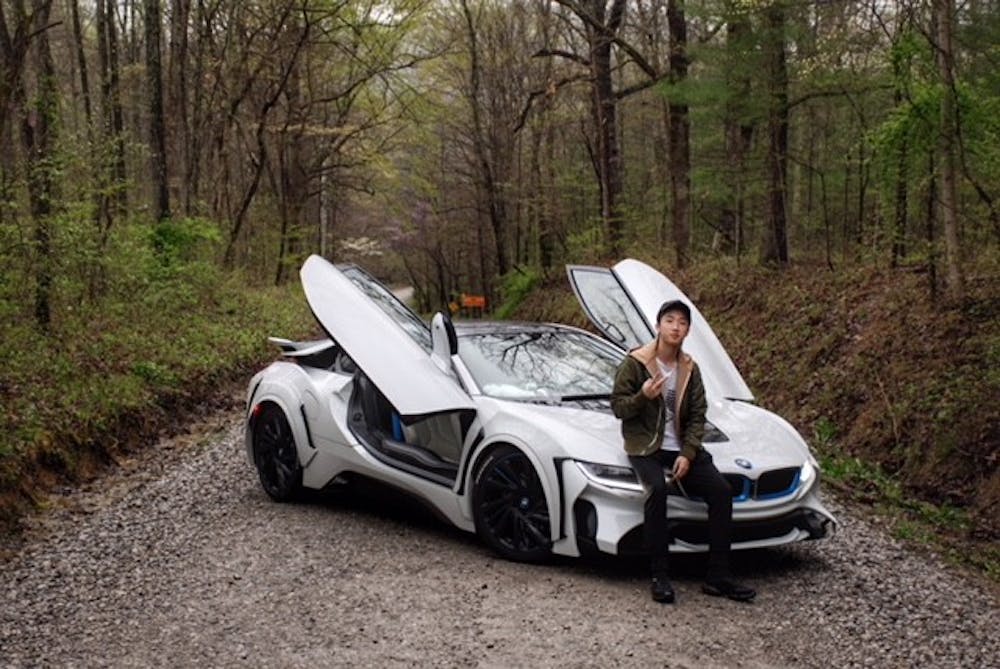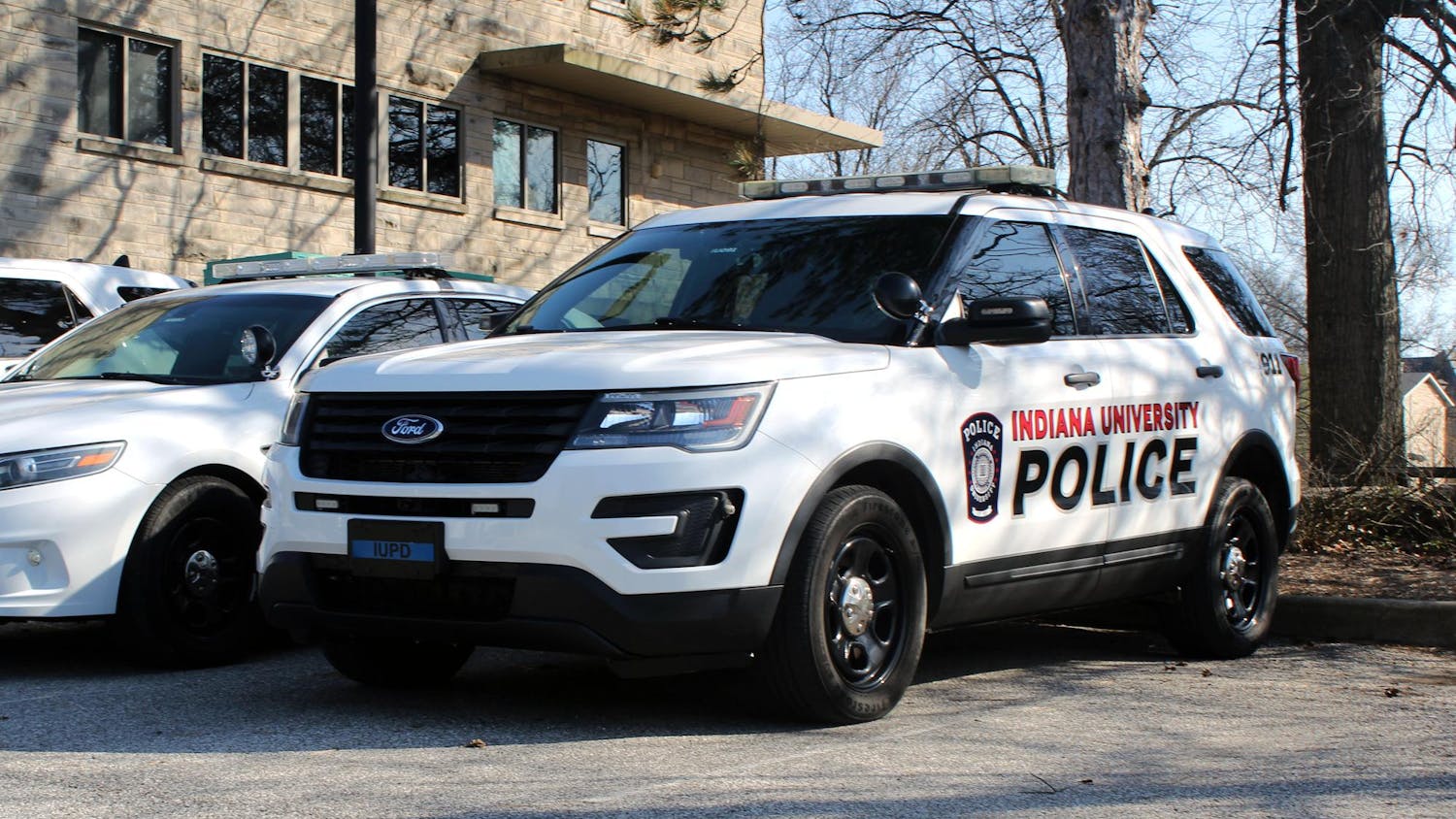The shiny white BMW i8 slid into the parking lot in front of the Thai restaurant. The driver’s door flew up and a young man stepped out in fitted black pants and leather jacket, his dark hair slicked up.
Longjie Lin, a 20-year-old sophomore at IU from Wenzhou, China, came to have a quick bite before his meeting with members of Lucky Seven, the luxury car club he founded six months ago.
“Look at that high-end BMW,” a passerby said, voice tinged with subtle bitterness.
Lin was out of earshot for those comments. But he wouldn’t care even if he heard them. In this small Midwestern city, such uninvited attention to Lin and his luxurious sports car is almost guaranteed. He is used to it.
In Lucky Seven, more than 30 members — mostly Chinese with a couple American students — drive a nice or nicely modified car.
As the founder, Lin recruited all members by himself. The process was exclusive and by invitation only.
“We don’t want others to think that we are just a group of people showing off,” he said. “But there are some unspoken requirements. You’ll either have to be able to afford a nice car or really know and love your car to have made nice modifications to it.”
It doesn’t matter how much the car costs, Lin said. Passion is the key.
“We don’t want people who are just rich enough to afford a nice car,” he said.
There are three BWM i8s in the club, including Lin’s. Members affectionately call them butterflies because their flip-up doors resemble wings.
One of them cost $160,000, one of the club’s most expensive. An average family in Bloomington would have to save for more than three years without any expenses to afford a brand-new BMW i8.
While many students are burdened with immense student loans and juggling multiple jobs to afford rent and car payments, they can’t help but wonder about these BMWs, Mercedes-Benzes, Lamborghinis, Corvettes, Porsches. These cars, sometimes worth more than enough to pay for their college educations — who drives them?
Lin and his friends account for the lion’s share on campus.
People say the students who drive these cars are stuck-up rich kids and must be using daddy’s money, IU freshman Justin Duckett said. He takes photos for the club periodically and has befriended the members.
But the cars are more than a status symbol for the club members. They are a distraction from the boredom in Bloomington and a way to meet like-minded people.
When it comes to stares or snarky remarks, their motto is simple: Haters gonna hate. That never stops them from going about their lives on luxurious wheels.
IU freshman Hao Yu joined Lucky Seven two months ago. He drives a used Mercedes-Benz C-Class. It’s less expensive compared to other cars in the club, but still beyond most college students’ price point.
Yu said he knows the negative images linked to them — somepeople just hate rich people.
“American students have a different money mindset,” Yu said. “They try to save money to pay for their own tuition and don’t have that much spare money. My parents try to cater to my hobbies as long as they can afford them.”
Unlike a lot of privileged Chinese students driving fancy cars in the California and New York, Yu and Lin said their car club is simpler and focused more on their common interests — cars — instead of family wealth and other implications behind it.
“We only talk about cars, really,” Yu said. “If you look at our Instagrams, we rarely post photos of us and the car. It’s usually just photos of cars.”
Lin said he never asked about family backgrounds when recruiting new members.
“We don’t want to allow vanity in the team,” he said. “As long as you’re in, everybody is equal.”
The number of club members doubled in six months and still growing. They organize regular events, such as lakeside barbecues and races at tracks.
In the early stage of the Lucky Seven, the dozen members split up into little groups of social circles, making it hard for Lin to hold everyone together as a whole. As members started to know one another, small friend groups merge into bigger ones, and members are more willing to participate in group activities.
It means a lot to him when everyone is excited and actually wants to come to their events, Lin said.
“It’s fulfilling to see a gang of people having same interests gather around,” he said. “The club does bring joy to people.”
Lin had an idea of creating his own car club when he was writing his college applications. But his passion for cars traced back to his childhood, when he rode on the passenger seat of his dad’s white BMW i8. His dad would point at cars on the street to teach him how to tell different sports cars apart and assess them.
When he first came to IU, lots of things didn’t pan out as he expected.
He chose IU for its reputable Kelley School of Business but failed to get in. He had to settle for the management program in the Paul H. O'Neill School of Public and Environmental Affairs.
Later he found out the second reason he chose Indiana, the Indianapolis Motor Speedway, didn’t allow private cars to drive and race on the tracks.
In the sparsely populated town with few places to shop or entertain himself, he was bored instantly and felt lost and stuck in the middle of nowhere.
He started to connect with other Chinese students by creating groups on social media, mainly WeChat, the app most Chinese students use. He created a Chinese freshmen group, Willkie Quadrangle residents group, Zhejiang Province group, PlayerUnknown's Battlegrounds group and more.
“Chinese students are all in this very small circle linked by all the WeChat groups,” Lin said. “There’s no one I don’t know or I can’t reach through friends.”
Then he founded the car club. He reached out to the headquarter of Lucky Seven Club, a high-end car club based in Beijing consisting of more than 400 social elites from different fields. He discussed terms with the headquarter and founded the Bloomington chapter as the leader.
Six months later, this car club has become central to his life.
“It enriches my life, gives me a sense of belonging, and helped me find more friends to play cars with,” Lin said.
For 18-year-olds, starting life in a foreign country without friends can be daunting. Different languages, different foods, different cultures — these huge gaps in every aspects of life make it harder for these young people to adapt.
Many Chinese undergraduates studying at IU come from big cities abundant in entertainment. In Bloomington, there are fewer distractions.
As college freshmen juggle their first time living alone and figuring out their personalities and values, international students can get lost. They are out of their comfort zone and don’t know how to fit in. Being in a foreign country only accents the sense of loneliness.
“My first year here I felt so depressed,” Yu said, “I just wanted to stay home, because I didn’t want to socialize and didn’t know what I was supposed to do.”
He tried to befriend local students through a fraternity and a baseball team. Most people were nice, but he couldn’t fit in because he didn’t know or understand certain cultural references.
“I have not watched any of the cartoons they talked about,” Yu said. “And they haven’t seen any of the shows I watched.”
In Lucky Seven, Yu met people who come from similar backgrounds who share the same interests.
“At first I just wanted to meet more people,” Yu said. “Some have had cars for longer and know more about cars. I learned a lot by watching them care for their cars and modify them.”
Lin didn’t like parties or alcohol. With his car enthusiast friends, he found his place.
The club functions as a bridge, Yu said. It connects people.
Lin’s car is more than a vehicle for him – it’s beautiful, it’s speedy and it’s worth the money.
The $90,000 BMW never comes short of both lovers and haters.
Teenage girls on a school bus once waved at him while he was waiting for the signal to turn green. He waved back and saw giggles and screams broke out silently behind the windows. He pretended he didn’t see the drama and drove away. He felt more embarrassed than flattered.
But it always feels good when people come up and tell him he has a nice car.
Duckett, the club’s photographer, comes from a small town in Tennessee. He can sense the differences between him and these Chinese students whose slim-cut slacks draw a sharp contrast to his own sweatpants.
He personally believes in the American ideal of being self-made, and he’s currently paying off his Nissan Sentra SR loans. Still, Duckett thinks these Chinese students aim to succeed, and luxurious cars help them have a more positive mindset.
It’s important to be able to feel successful if one wants to succeed, Duckett said. A nice car must be essential to that feeling for those Chinese students.
Once a white guy spat at Lin. Another time, he was in his friend’s red Porsche Cayenne on the way to a vehicle maintenance store when a white guy coming from the opposite direction flipped them off in his car, out of the blue. His friend and him were confused but not bothered.
“Why should I care?” Lin said. “These things don’t really affect my life. I drove on and my life continued.”
Lin has a vision for Lucky Seven. He doesn’t want it to be merely for fun and making friends but wants to build a sustainable network with far-reaching benefits that link back to the original Lucky Seven in China.
“The current Chinese members in Beijing are already social elites and successful businessmen,” Lin said. “When we go back to China, we can still be active as members and share the existing resources. As we have fun as a group, we are also paving the way for future potentials.”
Speaking of what Lucky Seven means to him, Lin said he is happier now.
“It’s just my life now,” he said. “I spend a lot of time with my members. Besides school, I come to hang out with these people. I just go with the flows.”
In their minds, they are no different from any other Chinese students, worried about school and struggling to understand English.
As exams approach, Lin and his friends are getting busy with school. They study until late night at the libraries like everyone else.
The only difference is they drive home in their expensive cars.
Some interviews in this story were conducted in Chinese and translated by reporter Yue Sun.






